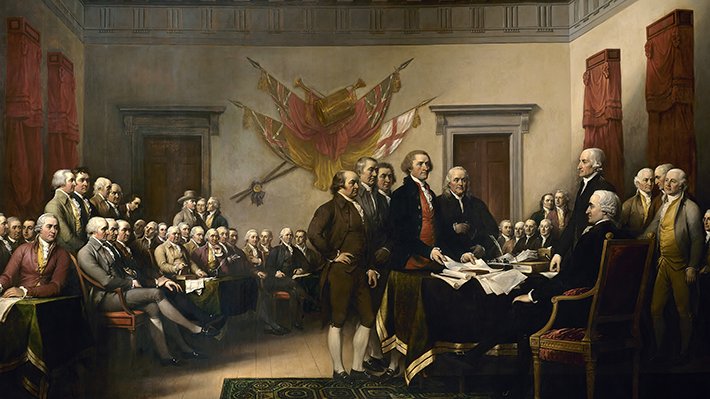Evolution vs. Religion in Ohio Schools
A bill currently pending in the Ohio state legislature called “The Ohio Student Religious Liberties Act of 2019” has resulted in statements that, if it becomes law, students would be allowed to give “wrong” answers in class should scientific findings conflict with their religious beliefs. One opponent was quoted as saying that if a student gave a biblically based answer of 6,000 years as the age of the earth, a teacher would be forced to accept it. Others have made similar charges.
The purpose of the law, according to its sponsor, state representative Timothy Ginter, is “a clarification, of those liberties already afforded our students in the Constitution and [the bill] seeks to remove ambiguity for our schools who are often confused as to what students can and cannot do in regard to religious expression, by providing a pathway they can follow that keeps them within constitutional guidelines.” Other sections in the proposed law guarantee students’ rights to participate in religious groups and to engage in religious expression. Opponents claim that because the rights the new law seeks to enforce are already guaranteed in the Constitution and elsewhere, the law is unnecessary.

But does the bill really make it okay, as opponents also claim, to say that two plus two equals five, if it is a matter of religious belief? Ginter firmly denies it and a reading of its relevant section would seem to bear him out: “No school district board of education, governing authority of a community school … shall prohibit a student from engaging in religious expression in the completion of homework, artwork, or other written or oral assignments. Assignment grades and scores shall be calculated using ordinary academic standards of substance and relevance, including any legitimate pedagogical concerns, and shall not penalize or reward a student based on the religious content of a student’s work.” It appears abundantly clear that even though students may express their religious beliefs, they will all be judged on the same academic standards.
Of course, the biggest flash point between education and religion reflected in the squabble about the bill is not arithmetic but the origin of the human race—a controversy which has been going on for well over a century and is mentioned in most of the media about the bill. Current law forbids teaching any religious-based ideas concerning evolution or the origin of the human species (and, by the way, Ginter’s bill will not change that).
Wouldn’t it be better to allow people’s different views to be openly talked about and debated?
Two fairly recent surveys done of U.S. adults gave somewhat different results, but indicate that between 18 and 40 percent believe that God created Man and Earth in their current form a few thousand years ago and that evolution never took place. On the other extreme, the surveys (one done by the Gallup Poll in June of 2019 and the other by the Pew Research Center in April and May of 2018) also show 22 and 33 percent respectively believe that evolution took place without any divine intervention. In the middle are those who believe that evolution happens over a long period of time but it is guided by God or a higher power. What both surveys have in common is that they show most people believe that God or a higher power had something to do with the creation of human beings and most people also believe in evolution. So, maybe we are not as far apart on the subject as is sometimes claimed.
The Gallup Poll results, which had the 40 percent response for a complete denial of evolution, included a graph going back almost 40 years showing very little change in the percentage of people who fall into each category. That would seem to indicate that forcing several generations of students to study over the top of deep disagreements and suppressing other ideas has not produced much of a result. Many educators have made statements to the effect that they don’t care whether students actually accept evolution, just that they are taught about it and give the correct responses when tested.
But that raises an obvious question: why teach a student something you don’t intend that student to believe and use?
One’s beliefs about what we are and how we came to be here are deeply personal to most people. Enforced education that goes against points of such profound conviction will naturally generate resistance. Wouldn’t it be better to allow people’s different views to be openly talked about and debated?
I don’t know how something that cuts so deeply into our understanding of ourselves is not going to be controversial.
It doesn’t help that those who believe the human race was created by something higher often have their religious beliefs assaulted by those who push the theory of evolution far beyond anything that can be demonstrated scientifically. It is all too commonplace to come across statements in the media to the effect of: “because of evolution, humans are hardwired to ______ (fill in the blank).” A bit of internet searching produces many such claims, like those made in a 2017 Scientific American article I found entitled, “Nasty, Brutish & Short: Are Humans DNA-wired to Kill?” The body of the article goes on to describe the work of a biologist who claims to have proven that humans are genetically designed for violence. He observes, for example, that our hands have evolved to easily make a fist. Yet he somehow doesn’t observe that our hands are far more frequently used in greeting each other, in the arts, in writing and other forms of communication, in healing the sick and many, many other peaceful activities. It seems that one could make a much better argument that the evolution of our hands shows that we are inherently nonviolent and so, despite his professional credentials, I can’t see anything in his work that qualifies as science.
To be sure, there are many scientists who would not agree that evolution dooms us to be violent, intolerant, racist and tribalistic. Still, there are too many instances such as the above in which evolution is put forward to support an unprovable assumption about human nature, making it inevitable that evolution will collide with deeply held beliefs and make it difficult or “controversial” to learn.

It is very evident to me as a Scientologist that we are spiritual beings who have the ability to transcend any behavior pattern that we may be compelled to act out. Further, there is more to this thing called life than just physical form. So, while I accept evolution as far as it goes, I think it is considerably less than a full explanation of what makes us what we are. Nor does it explain all of life’s complex interrelationships. Every religion that I know of and many philosophies hold that, through some combination of faith, self-discipline, counseling, enlightenment and moral and ethical education, we can rise to greater heights rather than being limited by our DNA. It is very easy to observe many people who have done so in the world around us. Isn’t universal public education founded on that very premise? Yet evolution doesn’t really explain why we can change ourselves for the better on our own free will—or why we should want to.
On the other hand, there is much about evolution that people should know. For example, disease-causing microbes evolve very quickly and, after a number of generations, develop resistance to antibiotics. Knowing the principles of natural selection and evolution has helped scientists understand this phenomenon and work out some solutions. That is valuable knowledge for high school students who, in a few years, will be responsible for keeping their own children healthy as well as themselves. There are many other ways in which evolution is a useful, practical field which can be demonstrated to be true regardless of one’s views of God or whether evolution has been occurring for many millions of years or only a few thousand.
That being said, I don’t know how something that cuts so deeply into our understanding of ourselves is not going to be controversial. Without claiming any expertise in the field of education, it seems to make a lot more sense to me to allow a wide, open discussion of the different ideas about how the human race came to be and why those ideas matter to people, while differentiating between what can be scientifically demonstrated and what is a matter of belief. It certainly seems a lot better than using classroom time to force certain students to absorb information they are never going to accept. Nevertheless, it doesn’t seem like change is coming any time soon. In the meantime, I don’t see any harm in the logic behind the Ohio Student Religious Liberties Act, which could help protect the rights of some students. But let’s not look at it as anything more than a stopgap, and let’s work for a day when we are sufficiently grown up and tolerant to be able to talk about such things as evolution, openly and completely.










